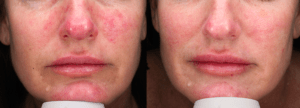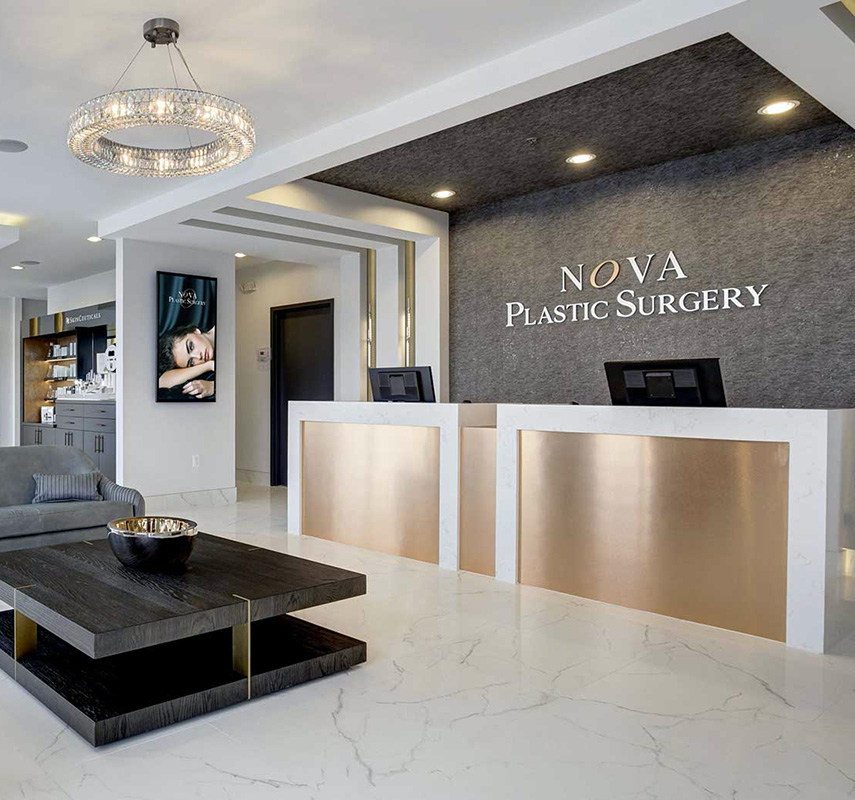
As dermatologic medicine has advanced over the years, we have made significant advances in managing rosacea. We now have treatment options that allow many of those who suffer from a generalized red face, facial flushing, and other aggravating symptoms that come with rosacea to live a comfortable life.
NOVA Plastic Surgery and Dermatology has multiple treatment options to help you get control of your rosacea.
What is Rosacea?
Rosacea is a chronic inflammatory condition that usually appears between the ages of 30-50, although it can show up earlier in life. Over time, it typically gets worse but can have periods of remission too. Typical symptoms include:
- Facial flushing (from heat, stress, exercise, etc.,)
- Acne bumps (cysts or pimples, but not blackheads or whiteheads,)
- Facial swelling
- Burning
- Itching
- Rhinophyma, a large, red, bumpy nose caused by rosacea.
- Ropey blood vessels around their nose or on their cheeks called telangiectasia
- Dry, flaky skin is also seen in about half of the people who suffer from rosacea
There are 4 main types of rosacea, and different treatments work better for certain subtypes of rosacea. Many people have an overlap of a few different types of rosacea.
- Erythematotelangiectatic rosacea is the type that includes the flushing of the face, the ropey blood vessels and the background redness.
- Papulopustular rosacea causes pimples and cystic acne-like bumps.
- Phymatous rosacea causes the skin to thicken and scar and can lead to rhinophyma. This type is seen more often in men.
- Ocular rosacea may cause watery, bloodshot eyes. Eyes can feel dry and gritty with burning, itching or stinging sensation. Some people with ocular rosacea are prone to styes or sensitivity to light. There is an oral treatment that can help.
We don’t know why people get rosacea. There seems to be a genetic component though, so it is common to see it running in families.
What makes rosacea worse?
While we may not know what causes rosacea, we do know there are many triggers that are associated with it. Common rosacea triggers are:
- Temperature (hot or cold weather)
- Caffeine
- Spicy foods
- Chocolate
- Alcohol
- Exercise
- Stress (stress makes just about every skin condition worse!)
Not everyone has the same triggers though, so there is not a specific rosacea diet that everyone with rosacea needs to follow. Life is a balancing act and moderation is key. Rosacea isn’t going to kill you, and some people really love their chocolate or spicy food. So, if you know your rosacea triggers and you cannot live without them, at least try to limit them right before a big event or family photo, so you are not flaring up at an inconvenient time.
Another thing that can make rosacea worse is the Demodex mite. Demodex is a microscopic mite that lives on the skin. Scientists have found that Demodex seems to be most abundant on the skin of those who also have rosacea. A prescription called ivermectin 1% cream (Soolantra) was developed to kill Demodex. It also happens to be anti-inflammatory, so it still works on people who don’t have a lot of Demodex on their skin.
Something else you want to avoid is topical steroid cream. In the very short term, steroids can help a little, but it doesn’t take much for steroids to make rosacea worse, so it is best to avoid them.
Is the sun safe for my rosacea?
Sun avoidance is important for many reasons. Sun can trigger rosacea to flare. In general, the sun will make anything red on your skin even more red, like a pink scar will burn much faster than normal skin. Rosacea also flares from the sun. The heat could be causing the superficial blood vessels to dilate and look redder, or it could be the ultraviolet radiation. At minimum, the radiation is going to cause wrinkles and sunspots, so you need to be using at least an SPF 30 at all times. Physical sunscreens that contain zinc oxide and titanium dioxide tend to be more gentle on sensitive skin, so those are the best for people with rosacea.
How do I treat rosacea?
While there are many different treatments that can control rosacea, there is nothing that will cure it. You may notice a more dramatic response with some treatments compared to others. Topical treatments for rosacea may be over the counter (OTC) or prescription. You may also be a candidate for an oral prescription or laser procedure.
Niacinamide, or Vitamin B3, is a powerful over the counter option to help reduce inflammation of the skin. Skinceuticals Metacell Renewal B3 and Discoloration Defense both have 5% niacinamide and can be great options to reduce inflammation while also offering you other benefits. During a flare, Skinceuticals Phyto Correct Masque is a great treatment to effectively reduce visual redness and discomfort. This calming facial mask cools on contact, lowers the temperature of your skin and provides comfort.
Gentle cleansers, instead of harsh facial scrubs, are the best for people with rosacea. The fewer ingredients to irritate the skin, the better. The same advice applies to moisturizers, it is very important to look for products for sensitive skin.
There are a few different prescriptions we use to treat rosacea, mostly topical. Laser treatments, like BBL, can also be very effective in treating the background redness and prominent, superficial blood vessels.
Prescription medications to help reduce inflammation and associated acne bumps:
- Topical metronidazole
- Azelaic acid (Finacea)
- Ivermectin cream (Soolantra)
Prescription medications to address the redness and flushing:
- Brimonidine (Mirvaso)
- Oxymetazoline (Rhofade.)
There is also an oral treatment that works very well when you have the cystic acne type of rosacea, or ocular rosacea. Evidence shows it may also help prevent rhinophyma. This is a low dose of an antibiotic called doxycycline (Oracea.) At this low dose, it does not kill any bacteria, so you do not have to worry about developing antibiotic resistance. This is a very important thing we want to avoid! Instead, this low dose has strong anti-inflammatory properties and works from the inside out to help treat those deep cysts and swelling people get during flare ups. Sometimes insurance companies give us a hard time when we prescribe this one, so you may have to try something else first before it gets approved.
Rosacea is a chronic condition; there is no cure. Once you find a treatment regimen that works for you, be prepared that you may have to tweak it over time to accommodate occasional flare ups. If a certain season triggers your rosacea more, you may have to be more aggressive with your treatments for awhile. Once you know your triggers, you may be able to predict flare-ups and minimize them by treating them quickly.
Many of the treatments are not safe if you are pregnant, trying to get pregnant, or breastfeeding, so we will discuss which ones are most appropriate for you during your appointment.
Think you have rosacea? Call NOVA Plastic Surgery and Dermatology and book your Dermatology appointment in Ashburn, VA now 703-574-2588


